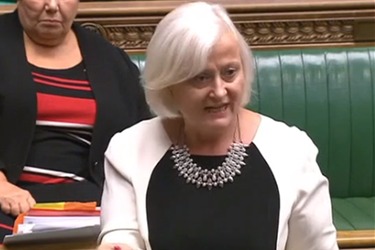
Yesterday, Siobhain outlined the impact tax credit cuts will have on families in Mitcham and Morden. 6,000 families in the constituency will feel the impact of the cuts to Child Tax Credits and Working Tax Credits, as well as the 11,400 children in those families.
Siobhain also argued that the cuts will hit those working in the lowest-paid, undervalued but important sectors, like cleaning, health and social care, and catering, who tend to be women.
You can watch Siobhain's speech in the House of Commons
online here (17.15 onwards).
You can also read a longer version of the speech below:
'Thank you Madam Deputy Speaker.
The Conservative party claims to be the ‘party of working people’. It apparently believes that cuts in tax credit value and eligibility will be off-set by increases in the minimum wage and personal allowance extensions.
But there is a huge amount of evidence that makes it clear that these changes will overwhelmingly make working people a great deal worse off.
Cuts in corporation and inheritance tax, are being funded by the tax credit cuts we are debating today, amounting to a staggering £9.7bn.
And this trade-off is a real, hard fact of life for the six thousand working families in my constituency, Mitcham and Morden, who rely on tax credits, and the 11,400 children in those families. The average financial loss across all affected families is estimated to be £1,300 a year, but many families will be much worse off. The government’s disconnected decisions are about to make their lives a great deal harder.
The Prime Minister has claimed that tax credits are part of a ‘merry go round’, a seemingly pointless mechanism to help the low-paid.
But tax credits have had an incredible impact in people’s lives in the relatively short time since they were introduced in 2003, ‘to tackle child poverty and make work pay’. The Institute for Fiscal Studies has found that the most significant factor in reducing child poverty since the nineteen-nineties was the spending on these entitlements for low-income families. By easing the transition into work, tax credits have also had a discernible effect in boosting employment levels.
But these advances take investment and time, and they are about to be snatched away, hitting the majority of the 56 per cent of families receiving tax credits in my constituency.
The cuts will have an overwhelming impact on working people in many different ways.
My honourable friends will be familiar with the ‘work penalty’ that is being created. And we all know that the cuts will not be offset by either the extension of the personal allowance or by the so-called ‘National Living Wage’. In fact, the sum of these changes will leave 24.4 per cent of all UK employees struggling on less than the living wage by 2020. That does not feel like progress to me.
And there is a third, often neglected area of concern. The cuts will have a gendered impact, significantly affecting women much more than men.
Capital and wealth continues to be concentrated in the hands of men, who tend to earn more. On the other hand, women are most adversely affected by cuts to social security, as they have to rely on it more.
For instance, women are far more likely to be single parents. 42% of single parents in the UK live in relative poverty after housing costs, of which 90% are women. Women also work as mothers and carers for elderly relatives. And when in work, they are more likely to work part-time, in the most underpaid and undervalued jobs, like catering, cleaning and social care.
Indeed, the Fawcett Society has shown that 62% of workers paid below the Living Wage are women, while the considerable gender pay gap of 19% stubbornly continues.
Tax credits are therefore a lifeline for women in low paid work. And the Women’s Budget Group has demonstrated that these cuts will undermine advances in gender equality. While the majority of people gaining from tax cuts will be men, who will benefit by £1.5bn a year by 2020, most of those losing out from tax credit cuts will be women, who will lose £5.8bn a year by 2020.
The advances made in helping those on low-pay are about to be rolled back by a party that claims to represent the interests of working people, but in practice does no such thing.
The cuts are not inevitable. They are made off the back of tax cuts for multinational businesses and others, which overwhelmingly benefit the most affluent.
Meanwhile, for the majority of people who rely upon an ever-decreasing income to get by, the Conservative party does not presently serve their interests.'